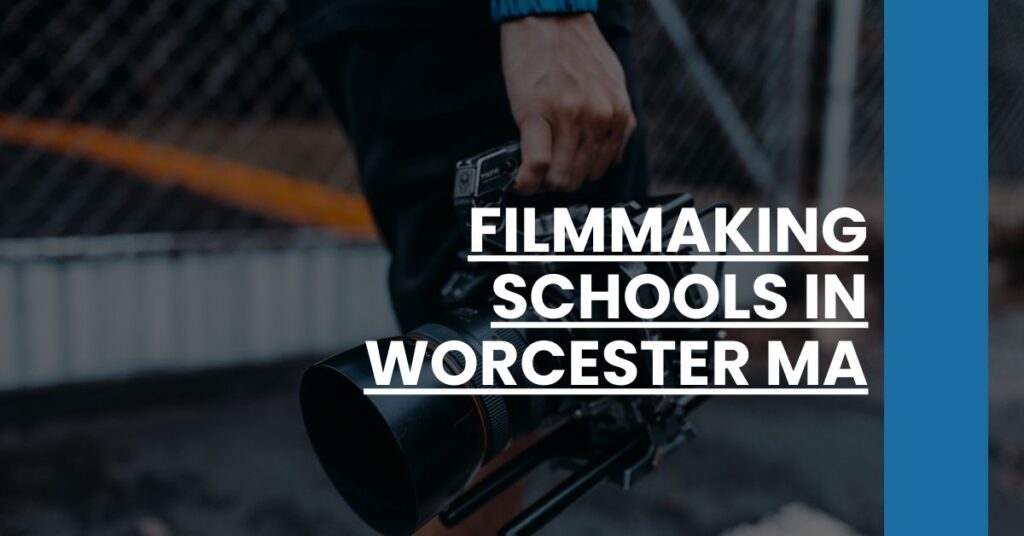Not in Worcester? Check out our lists of Filmmaking Schools in Boston, Brockton, Cambridge, Lowell, Lynn, New Bedford, Quincy, Springfield, and across Massachusetts.
Ever wondered where to kickstart your filmmaking dreams?
Filmmaking Schools in Worcester, MA offer top-notch programs tailored for aspiring filmmakers.
This article highlights the best options available, providing a clear path to your cinematic education goals.
The College of the Holy Cross – Film Studies
If you’re passionate about films and want to explore the theoretical and practical aspects of filmmaking, the Film Studies program at The College of the Holy Cross in Worcester, MA is a great place to start. This program offers a well-rounded curriculum designed to provide a robust understanding of cinematic arts.
Key features:
- Broad spectrum of courses: The curriculum includes survey classes in American and World Film, advanced film seminars, and thematic tutorials.
- Diverse analytical approaches: You will explore genre, narrative structures, culture, and cinema history.
- Practical aspects: Classes in theatrical direction and photography offer hands-on experience.
- Global perspective: Courses in French, Italian, German, and Russian film (taught in English) provide international insights.
What you’ll gain:
The Film Studies program at The College of the Holy Cross takes a holistic approach to film education. This ensures you develop critical analysis skills and a deep appreciation for films. The program is enhanced by a close-knit academic community and dedicated faculty, which fosters personalized attention and support.
For more information, visit The College of the Holy Cross Film Studies page.
Worcester Academy – Filmmaking Camp
For younger aspiring filmmakers, the Worcester Academy Filmmaking Camp offers an immersive experience. Perfect for students aged 8-15, this camp is a fantastic entry point into the world of moviemaking.
Key features:
- Hands-on learning: The camp includes writing, directing, shooting, and editing your own digital films.
- Fast-paced structure: Two days of camera work, writing, and directing, followed by two days of shooting exercises.
- Teamwork and collaboration: Students rotate through crew roles and support each other’s projects.
- Professional tools: Access to HD digital video cameras and advanced digital editing software.
Camp specifics:
- Dates: July 8th to 12th, 2024
- Age group: Open to boys and girls aged 8-15
- Schedule: 9:00 am to 3:00 pm daily
- Location: Rader Hall on Worcester Academy’s main campus
- Cost: $450 for the full week
The Worcester Academy Filmmaking Camp is led by an experienced director and provides a professional-standard filmmaking experience. By the end of the camp, you will present your completed projects, which is both rewarding and educational.
For more details, visit the Worcester Academy Filmmaking Camp page.
How to Choose the Best Filmmaking School
Choosing the right filmmaking school is critical to your success in the film industry. Here are several steps to guide you in making an informed decision that aligns with your career goals.
1. Evaluate the Curriculum
The curriculum forms the backbone of your education. Ensure the program covers:
- Foundational topics: Screenwriting, directing, cinematography, and editing.
- Advanced subjects: Film theory, history, and criticism.
- Specialized courses: Experimental film, documentary filmmaking, and animation.
2. Assess Faculty Expertise
The quality of your instructors can significantly impact your learning experience. Look for:
- Industry experience: Faculty who have worked in the film industry.
- Academic credentials: Professors with strong academic backgrounds.
- Reputation: Instructors known for mentoring successful filmmakers.
3. Examine Facilities and Equipment
Having access to modern facilities and state-of-the-art equipment is essential for practical learning:
- Film studios and sets: Well-equipped spaces for shooting and directing.
- Editing labs: Access to advanced editing software and hardware.
- Camera equipment: Professional-grade cameras and lighting equipment.
4. Look for Hands-On Opportunities
Hands-on experience is crucial in filmmaking. Investigate:
- Internships: Opportunities to work with production companies or film studios.
- Workshops: Intensive sessions focusing on specific skills.
- Student projects: Chances to create your own films as part of the curriculum.
5. Consider Industry Connections
Schools with strong industry ties can provide valuable networking opportunities:
- Guest lectures: Industry professionals who share their insights.
- Film festivals: Opportunities to showcase your work.
- Alumni network: A robust network that can help with job placements.
6. Financial Aspects
Understanding the financial commitment is key:
- Tuition fees: Compare costs across schools.
- Scholarships and financial aid: Look for available support to ease the financial burden.
- Return on investment: Weigh the costs against potential career benefits.
7. Campus Visit
If possible, visit the campuses to get a firsthand feel of the learning environment:
- Atmosphere: A supportive and engaging environment.
- Facilities tour: Check out the studios, libraries, and other resources.
- Current students: Talk to them about their experiences and get honest feedback.
Making an informed choice can lead to a fulfilling education and successful career in filmmaking.
Conclusion
This article has highlighted two excellent options for filmmaking schools in Worcester, MA—the College of the Holy Cross and the Worcester Academy Filmmaking Camp.
As you explore these or other programs, remember to consider curriculum depth, faculty expertise, facilities, and hands-on learning opportunities. By carefully evaluating these aspects, you can choose a filmmaking school that aligns with your aspirations and sets the foundation for a successful career in the cinematic arts.

